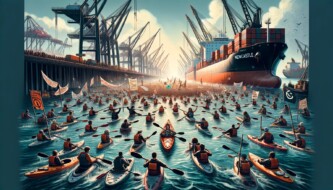Over 100 people have been arrested during a two-day protest at the world’s largest coal port in Newcastle, Australia. The activists, who swam or used kayaks to block the port’s shipping lane, were protesting against the lack of action on climate change. They claim that their disruption prevented over half a million tonnes of coal from being exported. Australia is the second largest coal exporter in the world and relies heavily on the fossil fuel for its own energy needs.
The Port of Newcastle, located 170km from Sydney, is the country’s most important terminal for coal shipments. Around 3,000 people from across Australia participated in the 30-hour blockade, which had been approved by the police. However, after the protest cut-off point, dozens of protesters remained in the water, leading to 109 arrests. Among those arrested were five minors, who were later released. On Monday, 104 people were charged for refusing to leave the harbour channel.
The protest was organized by Rising Tide, who have described it as the “biggest act of civil disobedience for climate in Australia’s history.” The demonstration took place just days before the start of COP28, the global climate change summit in Dubai. Rising Tide is calling on the government to tax thermal coal exports and cancel new fossil fuel projects.
Australia has been criticized for its slow response to climate change, but Prime Minister Anthony Albanese has promised to join global efforts to reduce emissions. His government has set a target of reducing emissions by 43% by 2030, up from the previous commitment of 26-28%. However, the government has also approved new coal mines and has more projects waiting for approval.
One of the protesters, 17-year-old Anjali Beams, said she was risking arrest because young people’s voices on climate change have been consistently ignored by decision-makers. She stated that she would not be complicit in allowing her future to be sold away for the profit of the fossil fuel industry.
In conclusion, over 100 people have been arrested during a protest at the Port of Newcastle in Australia, the world’s largest coal port. The activists were protesting against the lack of action on climate change and the country’s heavy reliance on coal. The protest took place just days before the global climate change summit and calls for the government to tax thermal coal exports and cancel new fossil fuel projects. The government has set a target to reduce emissions, but has also approved new coal mines. Young people, whose voices have been ignored, are taking a stand against the fossil fuel industry.
Original news source: Climate protest: More than 100 arrested at world’s largest coal port (BBC)
Listen
Slow
Normal
Fast
Group or Classroom Activities
Warm-up Activities:
– Charades
Instructions: Divide the class into two teams. Write down words or phrases related to the article on separate pieces of paper. Each team takes turns sending one member to act out the word or phrase without speaking while their team guesses what it is. The team with the most correct guesses wins.
– News Summary
Instructions: Have the students work in pairs or small groups. Ask them to read the article and then summarize it in their own words. Give them a time limit, such as 5 minutes, to complete the task. After the time is up, have them share their summaries with the rest of the class.
– Opinion Poll
Instructions: Create a list of statements related to the article, such as “Taxing thermal coal exports is an effective solution to combat climate change.” Have the students move around the room and find partners to discuss each statement. They should state their opinion and provide reasons to support it. After a few minutes, have them find new partners and repeat the process with a different statement.
– Vocabulary Pictionary
Instructions: Divide the class into small groups. Give each group a set of vocabulary words from the article. One student from each group will pick a word and draw a picture to represent it, while the rest of the group tries to guess the word. The student who guesses correctly gets to draw the next word.
– Pros and Cons
Instructions: Divide the class into two groups. Assign one group to argue the pros of taking action on climate change, while the other group argues the cons. Give them a few minutes to prepare their arguments, and then have a debate-style discussion, with each group presenting their points and responding to the other group’s arguments. Encourage the use of evidence and examples from the article.
Comprehension Questions:
1. What were the protesters in Newcastle, Australia, protesting against?
2. How did the protesters disrupt the port’s shipping lane?
3. How many people participated in the 30-hour blockade?
4. Why were dozens of protesters arrested after the protest cut-off point?
5. Who organized the protest and how did they describe it?
6. When is the global climate change summit taking place?
7. What is Rising Tide calling on the government to do?
8. Why did 17-year-old Anjali Beams participate in the protest?
Go to answers ⇩
Listen and Fill in the Gaps:
Over 100 people have been arrested during a two-day protest at the world’s largest coal port in Newcastle, (1)______. The activists, who swam or used kayaks to block the port’s shipping lane, were protesting against the lack of action on climate change. They claim that their disruption (2)______ over half a million tonnes of coal from being exported. Australia is the second largest coal exporter in the world and relies heavily on the fossil fuel for its own (3)______ needs.
The Port of Newcastle, located 170km from Sydney, is the country’s most (4)______ terminal for coal shipments. Around 3,000 people from across Australia participated in the 30-hour blockade, which had been approved by the police. However, after the protest cut-off point, dozens of protesters remained in the water, leading to 109 arrests. Among those (5)______ were five minors, who were later released. On Monday, 104 people were charged for refusing to leave the (6)______ channel.
The protest was organized by Rising Tide, who have described it as the “biggest act of civil disobedience for climate in Australia’s history.” The demonstration took place just days before the (7)______ of COP28, the global climate change summit in (8)______. Rising Tide is calling on the government to tax thermal coal exports and cancel new fossil fuel projects.
Australia has been criticized for its slow response to climate change, but Prime Minister Anthony Albanese has promised to join global efforts to reduce emissions. His government has set a (9)______ of reducing emissions by 43% by 2030, up from the previous commitment of 26-28%. However, the government has also approved new coal mines and has more projects waiting for approval.
One of the protesters, 17-year-old Anjali Beams, said she was (10)______ arrest because young people’s voices on climate change have been consistently ignored by decision-makers. She (11)______ that she would not be complicit in (12)______ her future to be sold away for the profit of the fossil fuel (13)______.
In conclusion, over 100 people have been arrested during a protest at the Port of (14)______ in Australia, the world’s largest coal port. The activists were (15)______ against the lack of action on climate change and the country’s heavy reliance on coal. The protest took place just days before the (16)______ climate change summit and calls for the government to tax thermal coal exports and cancel new fossil fuel projects. The government has set a target to reduce emissions, but has also approved new coal mines. Young people, whose voices have been ignored, are taking a stand against the fossil fuel industry.
Go to answers ⇩
Discussion Questions:
Students can ask a partner these questions, or discuss them as a group.
1. What are some reasons why people might participate in a protest like this?
2. How do you feel about the government’s response to climate change in Australia?
3. What do you think are the most effective ways to address climate change?
4. How would you feel if your voice and concerns were consistently ignored by decision-makers?
5. Do you think civil disobedience is an effective method for bringing about change? Why or why not?
6. What role do you think young people should have in addressing climate change?
7. How do you think the fossil fuel industry can be held accountable for its impact on the environment?
8. What are some alternative sources of energy that could replace coal?
9. Do you think it is fair for the government to approve new coal mines while also committing to reduce emissions?
10. How would you feel if your country heavily relied on a fossil fuel for its energy needs?
11. What are some potential consequences of not taking action on climate change?
12. How do you think the government could encourage the development of renewable energy projects?
13. Do you think taxing thermal coal exports is a good solution to address climate change? Why or why not?
14. What role do you think international cooperation plays in addressing climate change?
15. How would you feel if you were one of the protesters risking arrest for a cause you believe in?
Individual Activities
Vocabulary Meanings:
Match each word to its meaning.
Words:
1. arrested
2. protest
3. coal
4. climate change
5. fossil fuel
6. emissions
7. government
8. activists
Meanings:
(a) The governing body of a nation or state
(b) A natural fuel formed in the geological past from the remains of living organisms
(c) Taken into custody by the authorities
(d) Long-term alteration of temperature and typical weather patterns
(e) People who take action to bring about social or political change
(f) A black or brownish-black combustible rock
(g) The release of gases into the atmosphere, especially by human activity
(h) A public demonstration expressing strong objection
Go to answers ⇩
Multiple Choice Questions:
1. Where did the protest take place?
(a) Sydney
(b) Port of Newcastle
(c) Melbourne
(d) Brisbane
2. How many people were arrested during the protest?
(a) Over 100
(b) Less than 50
(c) Exactly 100
(d) More than 200
3. What were the protesters blocking at the port?
(a) Road access
(b) Train tracks
(c) Air traffic
(d) Shipping lane
4. What is Australia’s rank in terms of coal exports?
(a) First
(b) Third
(c) Fourth
(d) Second
5. What organization organized the protest?
(a) Rising Tide
(b) Greenpeace
(c) Extinction Rebellion
(d) Friends of the Earth
6. What is the target for Australia’s emissions reduction by 2030?
(a) 26-28%
(b) 50%
(c) 43%
(d) 30-35%
7. What is the main demand of the protesters?
(a) Shut down all coal mines immediately
(b) Increase coal exports to boost the economy
(c) Tax thermal coal exports and cancel new fossil fuel projects
(d) Ignore climate change and continue relying on coal
8. Why did 17-year-old Anjali Beams participate in the protest?
(a) She wanted to make a profit from the fossil fuel industry
(b) Young people’s voices on climate change have been ignored
(c) She wanted to disrupt the global climate change summit
(d) She wanted to support the government’s efforts to reduce emissions
Go to answers ⇩
True or False Questions:
1. The protest was organized by Rising Tide, who called it the “smallest act of civil obedience for climate in Australia’s history.”
2. Australia is the second largest coal exporter in the world.
3. The Port of Newcastle is the country’s most important terminal for coal shipments.
4. The government of Australia has approved new coal mines following a target to reduce emissions.
5. The protest aimed to draw attention to the lack of action on climate change.
6. The activists used hiking and canoeing to block the port’s shipping lane.
7. The disruption caused by the protest prevented over half a million tonnes of coal from being exported.
8. Over 10 people were arrested during a two-day protest at the Port of Newcastle in Australia.
Go to answers ⇩
Write a Summary:
Write a summary of this news article in two sentences.
Check your writing now with the best free AI for English writing!
Writing Questions:
Answer the following questions. Write as much as you can for each answer.
Check your answers with our free English writing assistant!
1. What were the protesters in Newcastle, Australia, specifically protesting against?
2. How many people participated in the 30-hour blockade at the Port of Newcastle?
3. What organization organized the protest and how did they describe it?
4. What target has the Australian government set for reducing emissions by 2030?
5. Why did 17-year-old Anjali Beams participate in the protest?
Answers
Comprehension Question Answers:
1. The protesters in Newcastle, Australia, were protesting against the lack of action on climate change and the country’s heavy reliance on coal.
2. The protesters disrupted the port’s shipping lane by swimming or using kayaks to block it.
3. Around 3,000 people participated in the 30-hour blockade.
4. Dozens of protesters were arrested after the protest cut-off point because they remained in the water.
5. The protest was organized by Rising Tide, who described it as the “biggest act of civil disobedience for climate in Australia’s history.”
6. The global climate change summit, COP28, is taking place in Dubai.
7. Rising Tide is calling on the government to tax thermal coal exports and cancel new fossil fuel projects.
8. 17-year-old Anjali Beams participated in the protest because young people’s voices on climate change have been consistently ignored by decision-makers and she did not want her future to be sold away for the profit of the fossil fuel industry.
Go back to questions ⇧
Listen and Fill in the Gaps Answers:
(1) Australia
(2) prevented
(3) energy
(4) important
(5) arrested
(6) harbour
(7) start
(8) Dubai
(9) target
(10) risking
(11) stated
(12) allowing
(13) industry
(14) Newcastle
(15) protesting
(16) global
Go back to questions ⇧
Vocabulary Meanings Answers:
1. arrested
Answer: (c) Taken into custody by the authorities
2. protest
Answer: (h) A public demonstration expressing strong objection
3. coal
Answer: (f) A black or brownish-black combustible rock
4. climate change
Answer: (d) Long-term alteration of temperature and typical weather patterns
5. fossil fuel
Answer: (b) A natural fuel formed in the geological past from the remains of living organisms
6. emissions
Answer: (g) The release of gases into the atmosphere, especially by human activity
7. government
Answer: (a) The governing body of a nation or state
8. activists
Answer: (e) People who take action to bring about social or political change
Go back to questions ⇧
Multiple Choice Answers:
1. Where did the protest take place?
Answer: (b) Port of Newcastle
2. How many people were arrested during the protest?
Answer: (a) Over 100
3. What were the protesters blocking at the port?
Answer: (d) Shipping lane
4. What is Australia’s rank in terms of coal exports?
Answer: (d) Second
5. What organization organized the protest?
Answer: (a) Rising Tide
6. What is the target for Australia’s emissions reduction by 2030?
Answer: (c) 43%
7. What is the main demand of the protesters?
Answer: (c) Tax thermal coal exports and cancel new fossil fuel projects
8. Why did 17-year-old Anjali Beams participate in the protest?
Answer: (b) Young people’s voices on climate change have been ignored
Go back to questions ⇧
True or False Answers:
1. The protest was organized by Rising Tide, who called it the “smallest act of civil obedience for climate in Australia’s history.” (Answer: False)
2. Australia is the second largest coal exporter in the world. (Answer: True)
3. The Port of Newcastle is the country’s most important terminal for coal shipments. (Answer: True)
4. The government of Australia has approved new coal mines following a target to reduce emissions. (Answer: False)
5. The protest aimed to draw attention to the lack of action on climate change. (Answer: True)
6. The activists used hiking and canoeing to block the port’s shipping lane. (Answer: False)
7. The disruption caused by the protest prevented over half a million tonnes of coal from being exported. (Answer: True)
8. Over 10 people were arrested during a two-day protest at the Port of Newcastle in Australia. (Answer: False)
Go back to questions ⇧















